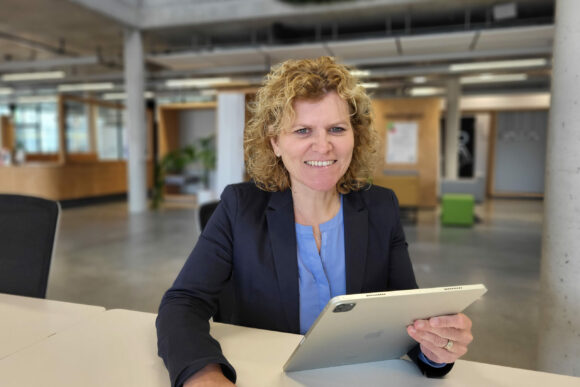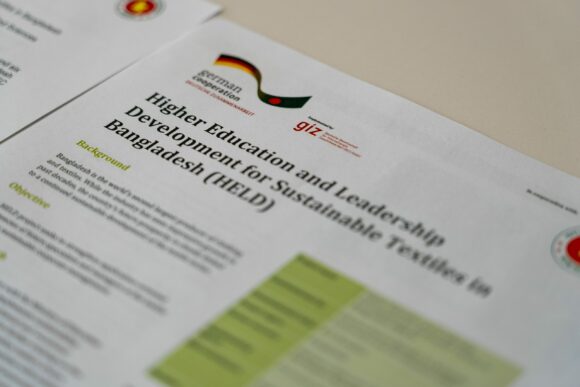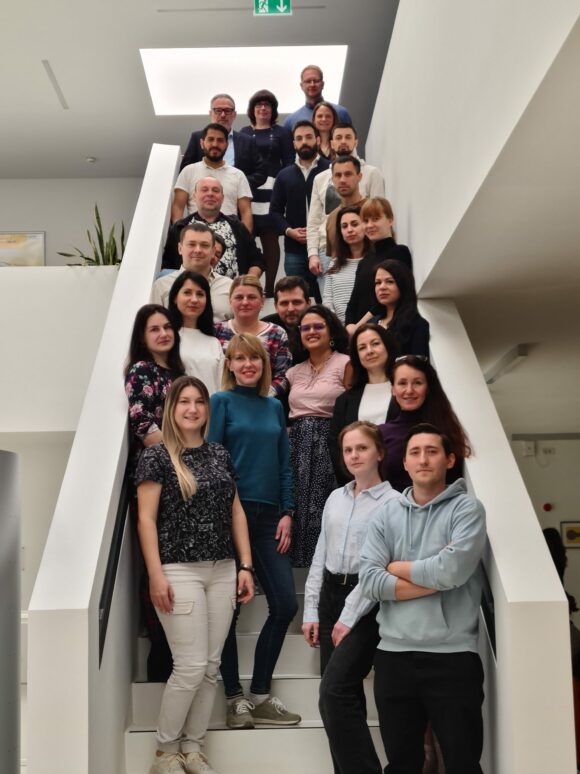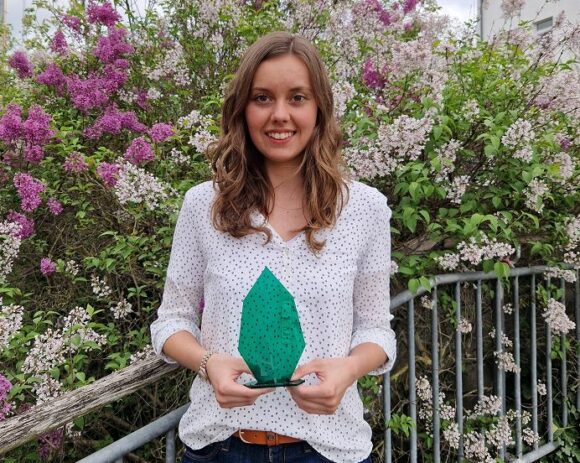At the 3rd Water Symposium on November 15, 2023, the new Competence and Transfer Center for the Sustainable Sponge Region (ktns) was launched. The founding of the ktn was essentially a reaction to the results of the SPORE project, which was co-funded by the WILO Foundation and the Oberfrankenstiftung. Prof. Günter Müller-Czygan, head of the Institute for Sustainable Water Systems (inwa), explains in an interview how important the topic has become and how the new competence center can help those involved in administration and companies to mitigate the consequences of climate change.

Prof. Müller-Czygan, why did you decide to establish a new competence and transfer center?
“The founding of ktns is a response to the needs of local authorities, specialist engineers, architects and urban planners. But also to the demand from companies in Upper Franconia and Bavaria, who need to adapt our cities and municipalities to climate change. The topic of water is increasingly in focus, as we are feeling the effects of climate change primarily in the form of more frequent heavy rainfall and longer and longer periods of drought, where we then run out of water.”
And the sponge city concept can effectively help here..
“It provides effective solutions, yes. Rainwater is collected and retained like a sponge – e.g. in open water areas, in infiltration channels(gutters/drainage ditches, the ed.), in underground storage tanks or on special green roofs. The rainwater then no longer flows uncontrollably over the sealed surfaces, which prevents or at least mitigates flooding. After the rain event, the reservoirs are emptied, which is the equivalent of squeezing out the sponge. In summer on hot days, the stored rainwater can be used for various applications such as watering plants, saving precious drinking water.”
Hof University of Applied Sciences has been working on the concept for a long time and is passing it on..
“In our two projects SPORE (Smart Sponge Region Oberfranken) and in the course “The path to the sponge city – urban development in times of climate change”, we have analyzed and co-developed various solutions based on the sponge city concept and have now brought the state of the art and technology closer to more than 60 participants. In addition to the technical content, the topic of sustainability also plays a central role, and Prof. Manuela Wimmer has been supporting us as a sustainability expert since the beginning of our activities in the field of sponge solutions. Together, we have established the great importance of sustainability in sponge concepts and decided to name the new competence and transfer center “sustainable sponge city/region”. In discussions with project participants and attendees, it became clear that two essential things are currently lacking in order for sponge city stakeholders to be able to take action:

On the one hand, there are many good ideas and application examples, but these are not centrally available anywhere. The second point is probably the more important problem: the stakeholders lack the time and experience to transfer the good ideas and examples to their own use case, as well as a suitable roadmap on how to proceed.”
How can the new competence center help here?
“We have developed suitable methods for precisely the second point at inwa and now want to make these available to stakeholders via the new competence and transfer center. We want to become the missing central information point on the topic of sponge cities in Bavaria and beyond in the future. And something else has become clear to us in the projects: rural areas such as Upper Franconia need their own adapted solutions. That is why we are not only looking at the sponge city, but also at the sponge region in cooperation with the agricultural and forestry sectors.”
How different are the requirements and expectations here?
“My colleague Wimmer and I have carried out two extensive studies on digitalization and identified solutions and expanded these for the sponge city.
In discussions with the stakeholders, it became clear that it is imperative to look at the measures required to adapt to climate change from different perspectives and to analyze the different needs of those involved. In doing so, it is particularly important to ensure that possible measures are aligned with the day-to-day work of the stakeholders and that the increasing complexity of tasks is taken into account. Otherwise, the efforts will fail. We have already experienced this phenomenon with digitalization and it is now repeating itself with the sponge city issue. We have carried out two extensive studies on digitalization and identified possible solutions. We are now also benefiting from this experience with the sponge city. For precisely this special, holistic approach, we have developed the multi-level analysis, a suitable method for analyzing complexity and everyday working life, which we have already put through its paces in SPORE and on the course.”
What exactly does this mean?
“With the multi-level analysis, we can identify existing “sponge potential” in cities and municipalities and examine how it can be ideally implemented in everyday working life. In doing so, we pay particular attention to the right combination of the measures in question with other everyday challenges and can discover synergy potential with other projects and activities using the holistic approach. In this way, cities and municipalities can better manage the path to becoming water-sensitive cities/regions in terms of funding and personnel. The multi-level analysis is closely linked to the holistic approach of sustainability and has already proven to be very suitable and will become an important tool in the new ktns. Complexity management and sustainability are thus two essential, closely linked pillars of ktns.
In line with the objectives of our competence centers at the university, we want to bring together the interdisciplinary expertise from our research groups and colleagues on the topic of the sponge city/sponge region and make it available to the region’s stakeholders.”
Prof. Günter Müller-Czygan
While working on our projects and developing the course, we realized that we are currently the only scientists here at Hof University of Applied Sciences who are trying to grasp the issue of the sponge city/sponge region in all its complexity from a holistic perspective and to develop tools from this position in order to deal with it effectively and purposefully. With the competence and transfer center, we also want to make it clear why Hof is the Bavarian competence location for water.”

Institute for Sustainable Water Systems at Hof University of Applied Sciences (inwa);
Image: Hof University of Applied Sciences;
What specific topics and tasks will the competence center initially focus on?
“We are planning two main areas of work at ktns, which we call knowledge storage and transfer and consulting & coaching. On the one hand, we want to collect existing knowledge about the sponge city/sponge region in a web-based knowledge repository and make it available for public use. In order for this knowledge to be put into practice, a corresponding transfer is required, which we want to ensure in the form of courses, training and lectures, intensive networking and with the help of new test fields for practical training.
With the second focus of consulting & coaching, we want to close a current gap, which we call “Phase 0″…”
Phase 0? What is that?
“In order for the solutions and ideas from the knowledge repository to be implemented, they must first be checked for suitability with the local conditions, e.g. with the help of multi-level analysis, and then adapted for the respective case before the municipalities and their planning offices can start with the actual planning. The term “Phase 0” comes from the fact that the work of the planning offices is divided into service phases 1 to 9. The new type of preliminary review and adaptation described above, which should take place before service phase 1, is not included in the normal service phases. We want to support and train local authorities and planning offices until they are able to carry out “Phase 0″ independently.”

What about staffing?
“The ktns is organizationally affiliated with the Institute for Sustainable Water Systems (inwa). We have been trying for almost six months to secure sufficient funding and have made representations to several ministries. Even though our idea of a new competence and transfer center for a sustainable sponge city/sponge region has met with a great deal of approval, we have not yet been able to realize the desired start-up funding in full. This involved both personnel and technical equipment. However, we have been promised support for individual projects. We have also received enormous support here in the region, and I would like to express my special thanks to our District Administrator Dr. Oliver Bär and our Lord Mayor Eva Döhla. We are currently in the process of securing funding for the first two positions for a period of two years with the great help of our President Prof. Jürgen Lehmann and hope that we will be able to do this during the first quarter of 2024. Until then, ongoing activities will be managed by the inwa coordination team. As far as specialist topics are concerned that can be assigned to individual research projects, our colleagues in the research groups will support us. In this way, we can build up the ktns step by step via various funding projects.”
What medium and long-term goals have you set yourself?
“First of all, we are starting to deal with inquiries from SPORE that could not be processed further within the project. There are also already new inquiries from the symposium that we will be supporting in the coming months. Over the next 2-3 years, we will then focus on setting up various test facilities at the Hof wastewater treatment plant, which we intend to build and operate primarily as part of research projects. In addition, we also want to implement various sponge solutions at the university site in order to give students an understanding of the topic on a real object and at the same time to work on open questions in research. How the ktns develops will largely depend on the availability of funding, which has not become any easier as a result of the Karlsruhe ruling on the federal budget.
The sponge city/sponge region issue will remain with us for a very long time, as it is one of the most important bundles of measures for adapting to climate change. I am therefore certain that we will be able to steadily expand the ktns and highlight its importance in Upper Franconia and beyond.”
Prof. Günter Müller-Czygan
Thank you very much for this information!







